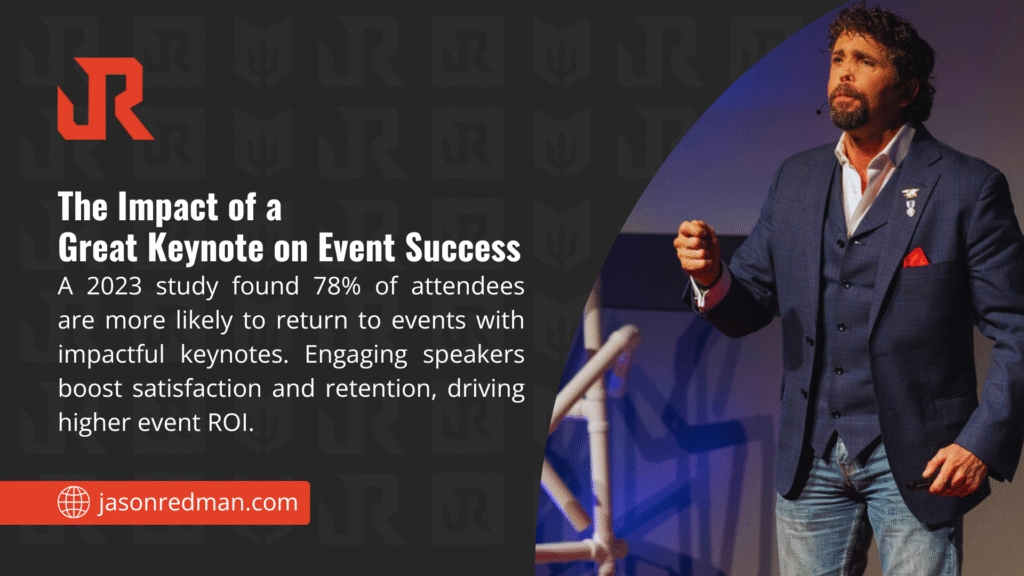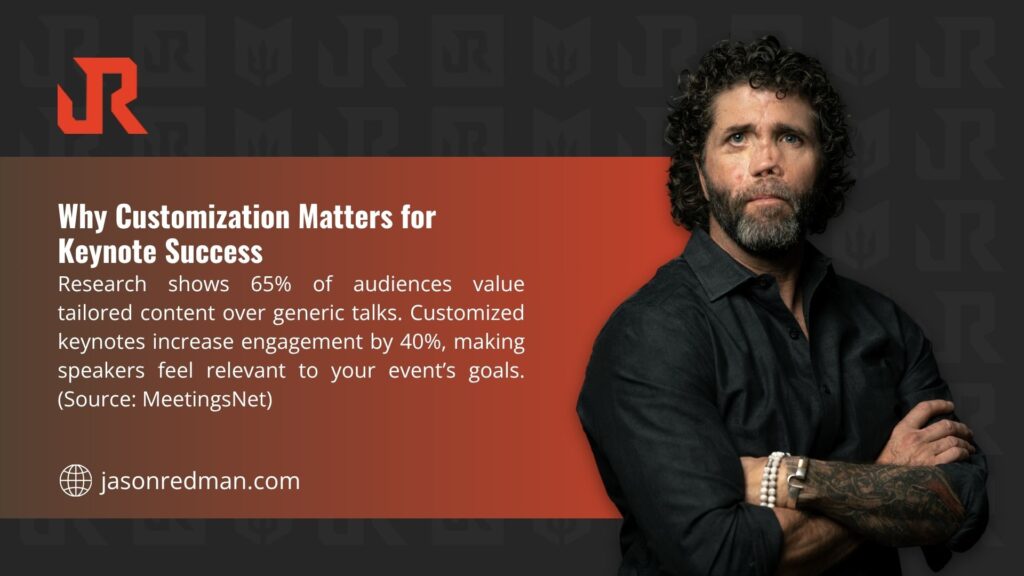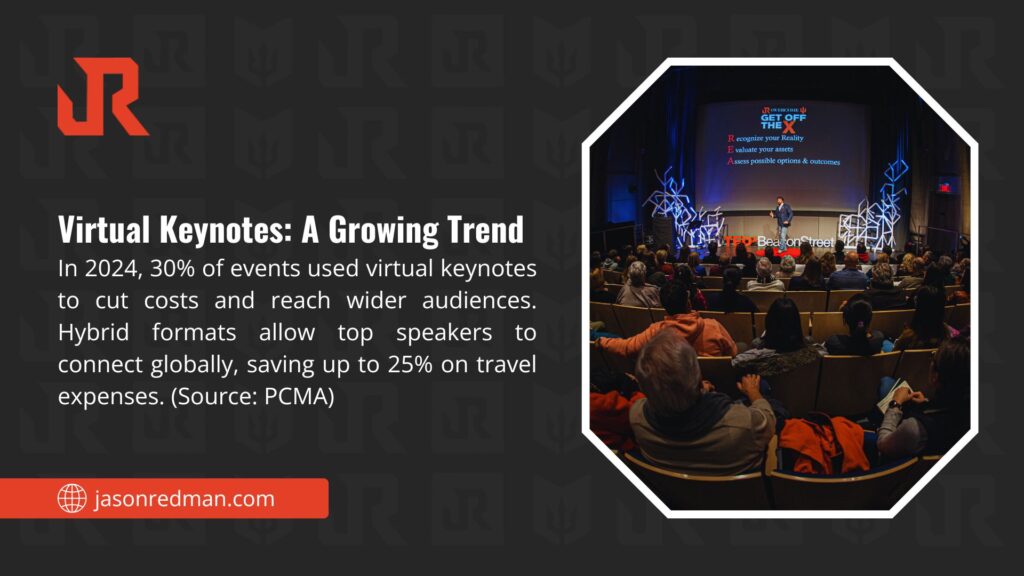Look, we’ve all sat through terrible keynote speeches. The kind where you’re checking your phone every five minutes, counting ceiling tiles, or planning your escape route. And if you’re the one responsible for booking that speaker? That’s a career-limiting move right there.
44% of executives say thought leadership from keynote speakers is the most effective way to get their brand message across. The right speaker can make or break your event. But good speakers book out 3-6 months ahead of time, and the really well-known ones? You’re looking at 6-8 months minimum.
And if you’ve never done this before, it probably feels overwhelming. Where do you even start? How do you know if someone’s actually good or just has a slick website? What if you spend $20,000 on someone who’s not good?
What You’re Actually Paying For
First things first, what even is a keynote speaker? They’re not the same as workshop leaders or panel moderators. Keynote speakers are your headliners. They’re the ones who set the tone for your whole event, usually with a 45-60 minute talk that’s supposed to inspire, educate, or fire people up.
The good ones do more than just talk at people. They read the room, adjust on the fly, and somehow make a crowd of 500 people feel like they’re having a one-on-one conversation. The bad ones? They basically read their slides out loud and wonder why everyone’s on their laptops.
What makes someone worth booking? Three things really stand out. One, they actually customize their content for your specific audience instead of copy-pasting the same speech they gave last week. Two, they balance the inspirational stuff with actual takeaways people can use. And three, they’ve got that thing – stage presence, charisma – that makes people pay attention instead of scrolling Instagram.
Before You Do Anything Else, Get Clear on What You Need
This is where most people screw up when figuring out how to find a keynote speaker. They start browsing speaker websites before they even know what they’re looking for. That’s like going to a car dealership before you know if you need a truck or a sedan.
Sit down and get specific about your event goals. Are you trying to pump up your sales team? Educate people about new industry regulations? Celebrate a big company milestone? Each of these needs a completely different type of speaker.
Then there’s your audience. A speaker who crushes it with executives might completely whiff with your front-line staff. Think about who’s actually sitting in those seats – their job titles, what keeps them up at night, what motivates them, what annoys them. The more specific you can get, the easier this whole process becomes.
| Speaker Type | What You’ll Pay | When to Book |
| Professional speakers | $5,000-$15,000 | 3-6 months out |
| Known experts/authors | $15,000-$40,000 | 6-8 months out |
| Big-name celebrities | $40,000+ | 8-12 months out |
Where to Find These People
You can find good speakers in the following locations.
Speakers Bureaus
Want the honest truth about how to find a keynote speaker without spending weeks on Google? Call a speakers bureau.
They’re usually free for you. They take their cut from the speaker’s fee, so you’re not paying extra. And you get someone who actually knows this world – they can tell you who’s reliable, who customizes their content, and who’s a pain to work with.
A good bureau doesn’t just send you a list of names. They ask about your audience, your goals, your budget, and then match you with speakers who actually fit. They also handle all the annoying logistics – contracts, travel arrangements, all that stuff.
Ask Around
Sometimes the best recommendations come from people who’ve been in your shoes. Hit up colleagues who’ve organized similar events and ask who they’ve used. But don’t just ask “who was good?”, get specific. Did they show up on time? Did they customize their talk? Would you book them again?
Professional associations are a goldmine for this too. Other people in your industry have probably dealt with the same challenge. For anyone exploring how to find a speaker for an event across different scenarios, your network knows more than you think.
When someone gives you a name, dig deeper. Ask about the stuff that doesn’t make it into marketing materials – are they flexible? Do they roll with technical difficulties? How’s their energy at 8am versus 4pm?
Check Out Authors and Content Creators
Some really good speakers aren’t professional speakers at all – they’re authors, podcast hosts, or industry bloggers who also speak. They’ve already got the expertise and the communication skills. You just need to make sure they’re comfortable on stage, because some brilliant writers freeze up in front of live audiences.
Look at who’s writing for the big publications in your industry. Who’s getting their articles shared like crazy? Those are people whose ideas resonate. Just verify they’ve got some speaking experience under their belt.

How to Tell If Someone’s Actually Good
You could decide whether someone is actually good based on these 3 factors.
Watch How They Work a Room
Speaking style matters way more than credentials. Watch how they open their talk, how they transition between points, how they wrap up. Good speakers vary their pace, change their tone, pause at the right moments. Bad speakers either rush through everything or drone on in monotone.
Look for real engagement with the audience. Do they ask interesting questions? Make people laugh? Reference things specific to that event? The best speakers make it feel like a conversation, not a lecture.
Red flags: speakers who hide behind their slides, never look at the audience, or just regurgitate stuff you could read on Wikipedia. You want someone with actual substance who can also command a stage.
Make Sure They Know Their Stuff
Fancy titles are nice, but what have they actually done? Have they built successful companies? Published real research? Done something noteworthy in their field? There are plenty of people calling themselves a motivational speaker who don’t have much behind the title.
Call their references. Ask specific questions: Did they deliver what they promised? How was the audience’s response? Did people talk about it weeks later, or forget it by lunch?
Watch out for people with inconsistent information on their website, no recent speaking gigs listed, or who are hard to find videos of. Legit speakers have their stuff together – updated websites, quick email responses, the whole deal. If you’re interested in the inspirational speaker route, these same standards apply.
Does Their Message Fit Your Event?
Even the best speaker in the world is useless if their message doesn’t match your event. See how they handle customization. Do they ask detailed questions about your audience and goals? Or do they push their standard talk with maybe your company name swapped in?
Ask for an outline that shows they understand your specific situation. Good speakers can explain exactly how their content addresses your needs and what people will walk away with.
Think about context too. A rah-rah growth message might feel tone-deaf if you’re going through layoffs. Super technical content might overwhelm an audience that just needs motivation. The fit has to feel natural.
Booking Someone
When you’re actually booking someone, make sure to do the following.
Start Early, Have Backup Plans
The good speakers book way in advance. 12-18 months for the really popular ones during busy seasons. If you can be flexible on your event dates, that helps a lot.
Keep a list of your top 3-5 choices instead of putting all your eggs in one basket. Your first choice might be booked. Your second choice might be out of your price range once you get the full quote. You need options.
Many speakers post their schedule online. Check that before you even reach out—saves everyone time.
Understanding the Real Cost
The speaking fee is just part of it. You’ve also got travel, hotel, meals, maybe special AV equipment. Budget at least 20-30% more than the base fee, especially if they’re flying in from across the country.
Some speakers are flexible on pricing depending on the situation – nonprofit events, opportunities to gain new clients, stuff like that. Others have fixed rates no matter what. It doesn’t hurt to ask, just be respectful about it.
Get Everything in Writing
You need a solid contract. Date, time, fee, payment schedule, who’s paying for travel, what AV setup they need, who owns the recording rights, what happens if someone has to cancel—all of it.
- Be clear about customization expectations.
- Are they interviewing your leadership team beforehand?
- Reviewing your annual report?
- How much customization are you actually getting for the fee?
Nail this down upfront so nobody’s disappointed later. Pick one person to be the main contact with the speaker. Too many cooks in the kitchen leads to mixed messages and confusion. Schedule regular check-ins as the event gets closer.

Don’t Make These Mistakes
Biggest mistake? Booking someone just because they’re famous. Name recognition gets people in the door, but it doesn’t guarantee they’ll deliver a message that matters to your audience.
I’ve seen big-name speakers completely miss the mark because their content wasn’t relevant.
Starting your search too late boxes you into whoever’s available instead of who’s actually best. Rushed decisions almost always lead to settling.
Skipping the video research is asking for trouble. Always, always watch multiple videos before you book anyone. Just like understanding how to be confident or finding good confidence training requires seeing real examples, you need to see speakers in action.
Not clarifying customization expectations leads to generic talks that feel disconnected from your organization. Have that conversation upfront about what they’ll do to make it specific to your needs.
Did It Actually Work?
Send out post-event surveys with real questions about the speaker. Watch what people share on social media during and after. What messages resonated enough that people posted about them?
Follow up a month or two later. Are people still talking about it? Did anyone change how they work because of something the speaker said? That’s what actually matters, not just whether people clapped at the end.
Compare what you spent to what you got – more registrations, sponsor interest, media coverage, actual behavior changes. Not everything has a dollar value, but you should see concrete results.

Want a Speaker Who Delivers Results?
As a decorated Navy SEAL combat veteran and bestselling author, Jason Redman brings real stories about overcoming impossible odds, leading through chaos, and building unshakeable resilience.
My keynotes hit differently because they come from someone who’s actually lived it. Fortune 500 companies, military organizations, healthcare systems, schools – my message resonates across the board because it’s authentic. I’m sharing what works when everything’s on the line.
The best speakers book up fast, so don’t wait until you’re scrambling at the last minute.


